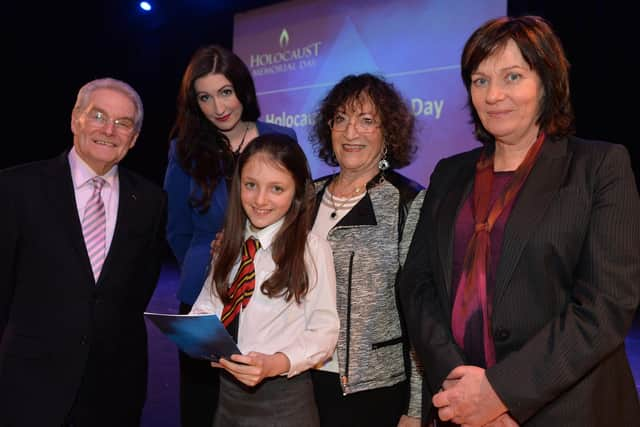All my grandparents were killed in the Holocaust, yet anti-Semitism is on rise again, says Northern Ireland woman


Shoshana Appleton, a member of the Belfast Council of Christians and Jews, was born in Jerusalem but moved to Northern Ireland after marrying local lawyer Ronnie Appleton.
She was speaking to the News Letter on Holocaust Memorial Day, the 75th anniversary of the liberation of the largest Nazi extermination camp, Auschwitz-Birkenau, on January 27, 1945.
Advertisement
Hide AdAdvertisement
Hide Ad“I never met my grandparents,” she told the News Letter. “My parents came to Israel as young pioneers before the rise of Hitler, it was in the early mid 1930s. They did not know that they would never see their families again.” As the Nazi grip on Europe tightened, her parents were busy trying to send their own parents visas to escape. Her mother was from Vienna and her father from Poland.


“But it was already too late,” she said. All four grandparents as well as extended family members were killed.
“My parents never spoke about it. Not for 50 years. If I ever mentioned grandparents, my mother would burst into tears so we knew not to – that it was a taboo subject.
“And I think this has happened to a lot of survivors. They didn’t speak about it for over 50 years and once they started they could not stop.
Advertisement
Hide AdAdvertisement
Hide Ad“Because they are worried that soon they won’t be here and there will be nobody to bear witness.
“Already, just 75 years later, we already have deniers – we already had them 20 years ago. People who are still walking around with tattoos on their arms – they just won’t be able to bear witness.
“And despite all the evidence around us, photographic and personal accounts, we still have deniers. That is the biggest worry to me. And on the other hand we have rising anti-Semitism.
“So have we moved on – I don’t know, it seems to be we are moving back to the dark. You would have thought ‘never again’ but there have been at least 15 other genocides, holocausts, since then all over the world.”
Advertisement
Hide AdAdvertisement
Hide AdDr Katy Radford from Northern Ireland’s Institute for Conflict Research told the News Letter that Holocaust Memorial Day is a time “of great sadness and reflection, not just for Jewish people in this part of the world but also for many people who recognise that the atrocities occurred can happen very easily if the silences and whispers are allowed to grow into hatred”.
The memory of her own families’ losses is still painful.
Her mother escaped the Nazis to England aged seven having lost her own mother and five brothers to the Nazis. She recounts the story of the Jewish Refugee Farm in Millisle which took up to 80 residents for nine years until 1948.
“It was a self-sufficient farm hailed as ‘an Ulster haven from Hitler’. It was exactly like a kibbutz.”
Some residents later moved on to live in Israeli kibbutzim where they brought their farming techniques with them.
Advertisement
Hide AdAdvertisement
Hide AdLast night Belfast City Hall hosted a Holocaust Memorial commemoration with survivor Tomáš Reichental, a Jewish survivor of the Bergen–Belsen concentration camp in Germany as a nine-year-old boy.
Mr Reichental was born in a Slovakian village in 1935, he told a reception at Belfast City Hall last night.
Thirty-five members of his wider family was taken away by the Nazis in 1939, and 13 members of closer family in 1944.
Normally they would have gone to Auschwitz to be killed but the advancing Russian army caused the Germans to blow up the gas chamber there, so their train was diverted to Bergen–Belsen.
Advertisement
Hide AdAdvertisement
Hide Ad“It is was just a miracle that we all survived because in normal circumstances this never happened,” he said.
At nine-years of age, he spent eight months in the camp.
“It was horrific. Every day we experienced beating and seeing people dying all around – and the smell of burning corposes.
“Our supervisers were SS women - they were worse than the men. If you stepped out of line you got a beating, even just because someone did not keep their place clean.”
They had to stand in the morning for an hour at –15C for roll call. Now he travels widely to speak to audiences of all ages.
“I am one of the last witnesses to this horrific tragedy that happened to the Jewish people,” he said.